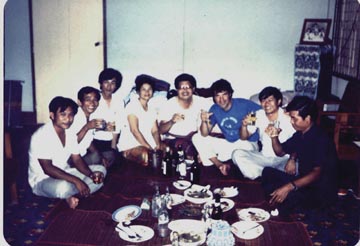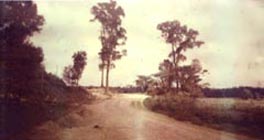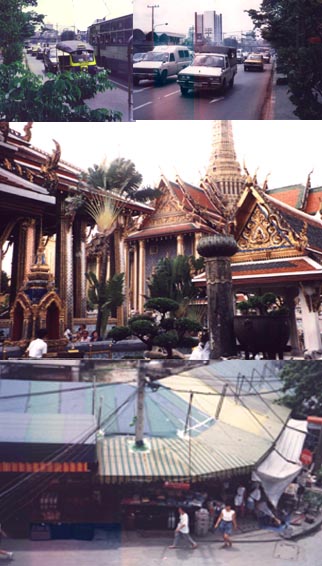RETURN OF THE NOT-SO-NATIVE
Peter Montalbano - Dec. 1984
Peter Montalbano - Dec. 1984
How do you speak of the “Kennedy Era” and not appear either corny or disillusioned?
We should be proud to be Americans, said our man in ’61, in “an hour when America stands as the only sentry at the gate, when we can see the campfires of the enemy burning on distant hills . . . ” This a lot of us bought, and some still feel a nostalgic twinge at those words, even though we were to cringe, eons later, at Reagan’s “evil empire” rhetoric.
More important to me than the truth or untruth in the brash chiaroscuro of JFK’s words to me is what it pushed me to do. Before Kennedy, there had been no Peace Corps.
When the thing came along I jumped at it. How many places can you get paid to learn a language, travel to a wild place, and work peacefully for social change? Before I knew it I was flying halfway around the world to
No matter what romantic notions or obscure purposes had brought me there, the experience did reach into my soul and seriously shake things around inside. This, even though when I came back to the S.F. Bay Area I put it out of mind for many years.
Maybe on return here I got too caught up in the sex, drugs, & rock’n’roll of the time. Maybe finding my niche in the
Then, quite unexpectedly, fate had me traveling again. And when fate plunked me down in
And what a glorious rush it was, that fall nearly twenty years later, looking down through the clouds on green rice fields cut by jigsaw ribbons of dark water, patches of jungle dotted with golden temple spires visible even from this high.
When I finally got to Nongkhai, I wondered, would Suriyon be there? Toshiro Mifune-like Suriyon, who’d used to dare me to chug more Mekong Whisky, and joke about my long-nosed ancestors. My surrogate father over there, my mentor, whom I had acknowledged by not so much as a postcard these 17-plus years . . . was the guy even still ALIVE?
Skip Bangkok, though it greeted me like an old friend, slow to recognize but full of warmth once the flame rekindled. Slide over the slow walks through Buddhist treasures, pilgrimages to old riverside haunts, the quick reawakening of the Thai language like a second soul within me. Desire for these things alone could have brought me back here. But more important were my friends, and that raucous Northeast culture.
On the upcountry overnight train I relaxed with a Singha (pronounced “sing,” rising tone) beer and fried rice while relearning the “twenty questions” game any “farang” (Westerner) has to be willing to play, especially if he knows some
Slowing through the red-orange dawn we pulled into Nongkhai, end of the line. A lonely breakfast at a riverfront restaurant, wondering if anyone I knew was nearby, or, if they were, if they’d even care I was there.
I gazed across the
After breakfast in the muggy morning heat, A patient search managed to turn up Amphon, the long-lost friend I’d had an idea was teaching at some school or other around town. We had a long, laughing reunion, and then the inevitable:
“Teacher Peter eat rice yet?”
“Eat already.”
“All right, go eat snacks together.” And, willy-nilly, it was on to the restaurant.
“Mekong Whisky, or beer?” There was no third choice.
The heat had become something powerful. And the experience was getting intense in other ways, too. Somehow Amphon had let the word out, as friends, old and new, began dropping in. It seemed most all I did in the next days was eat spicy food, sweat, and drink beer. This, and scramble to keep up with the Lao/Thai dialect that buzzed incessantly. And through it all, I was made the center of attention: a homecoming of sorts for a local hero, however undeserving.
Eventually, a question I had to ask: “What about ajaan (teacher) Suriyon?”
“Oh, he’s dead already.” (rather off-handedly)
“Yeah, that’s what I was afraid of. He used to drink a lot,” I said. By now Suriyon would’ve been 68 or so, and with his lust for zest, or whatever, unless he’d reformed, well . . . .
Before I’d known him, Suriyon had been headmaster at our school in the sleepy town of
The table chatter continued. After a while Amphon said, casually, again, “We’re going to Tha Bor for the funeral tomorrow. You’ll see everyone there.”
“What funeral?” I asked.
“ajaan Suriyon’s.”
“What?! When did he die, anyway?”
“A few days ago.” This was a shock. If I’d cut short the
That night there was duck sautéed with chilis, hot green papaya salad, and sticky rice at the house of Amphon and Lamduan, his beautiful wife. His colleagues and his (and my!) former students sitting on mats, chewing the fat. Lizards and moths doing their dance around the fluorescent ceiling light. Feeling amazed at being here at all, as though transported conscious to the center of a dream. Drink, drink, jabber and babble, in that melodic Lao. Memories of the later part of the evening are dim, but somewhere in there I promised one Khun Pratjan to do some English teaching at his school in a couple of days. That felt right.
I rode to Suriyon’s funeral shirtless, in the back of a pickup truck on a dusty riverside road, a new road showing no familiar landmarks but much feast for the eyes: houses on stilts before lush greenery, fields rich and full, huge white-and-gold Buddhas shining through the palms and banana trees. After an hour or so, my ears began to pick up the sound of monks chanting through the occasional feedback squeak of an overloaded P.A.: we were getting close.
A familiar strangeness washed over me as we entered the temple compound: 19 years before, it had been a fixture of my daily landscape.
This was a small town, but here were more people than at the biggest funeral I’d ever attended, at Grace Cathedral for Earl “Fatha” Hines.
Shirt back on and sleeves rolled down and buttoned, I sat quietly with the others under a huge awning and sipped soft drinks offered by uniformed schoolgirls looking just like those who had brought me their homework way back then. and then came the truly familiar faces: Phong-in—I’d been part of his wedding! Pitakpong, Playboy of the Eastern World, having just taken, they said, a seventeen-year-old bride. There was “Thin tiger,” and Somkhuan, and now-white-haired Ong-ad, the uptight headmaster who had deposed Suriyon. Then there was the contingent from the other side of the tracks: Somphaat, looking syphilitic and phaatbellied as ever, leering and waving my way.
Speakers came to the mike to praise Suriyon. Someone hurredly added my name to a roster, and I was called up to present a robe to the temple monks. Within a few minutes it felt as though I’d never left.
“Your letter came on the 9th,” Pitakpong told me, after the funeral. “Ajaan Suriyon died on the 9th.”
Coincidence? Conscious in a dream, again.
No farewell from Suriyon could have been more poignant than his death on the day my letter got there and the situation of his funeral smack in the middle of my visit. I felt he was lecturing me, more sternly than he’d ever spoken: “Don’t neglect your friends. Life is fragile: respect it. Keep in touch with your past.” Under the picture now still hanging in my room I can barely read the Thai script which translates as “I hope you don’t ever forget
That evening a bunch of my—and Suriyon’s, and Amphon’s—former students came over, and we had—what else?—another party! Like
The morning was brilliantly hot and clear when Khun Pratjan came to pick me up on his Honda 90 and we rode off to my first day to enter a Thai classroom in eighteen years. There it was, too, just the same: all together, class, “GOOSE MORNING, TEACHER!!” What better way to start a working day? The hours slid by quickly, with the kid version of the “twenty questions” game, same twenty from each class. “How old are you? How many brothers and sisters do you have? What sports do you like? Can you eat Thai food? Do you know a Thai song? Sing it. Do you know an American song? Sing that!” Expecting to be exhausted at the end, I felt, oddly, refreshed.
I spent another weekend in
I think now of Amphon and Lamduan seeing me off at the train, tears in our eyes . . . my prize student Narin waiting at the station in Udorn with a farewell gift . . . did I deserve so much kindness?
Whatever the answer to that question, I had seen the staying power of the Peace Corps experience, its ability to reach out with strength over the years. Wasn’t that, after all, the hope of the “New Frontier” dreamers when they dreamed up the thing? Is it corny to say that? It isn’t disillusioned, anyhow. Forget about politics, the ‘60’s criticisms of the Peace Corps as just a “tool of imperialism” on the one hand or the “Kiddie Corps” on the other. What’s important is that there’s this story to tell, and that I’ve grown from it. Is there a message in there for the world? I think so.
 Dinner on the first night at Amphon's
house. Now that's livin'!
Dinner on the first night at Amphon's
house. Now that's livin'!

Isaan, the only place I know that looks like this.

BKK . . .
ever raw, ever elegant, the more it changes, the more it's the same .
. .